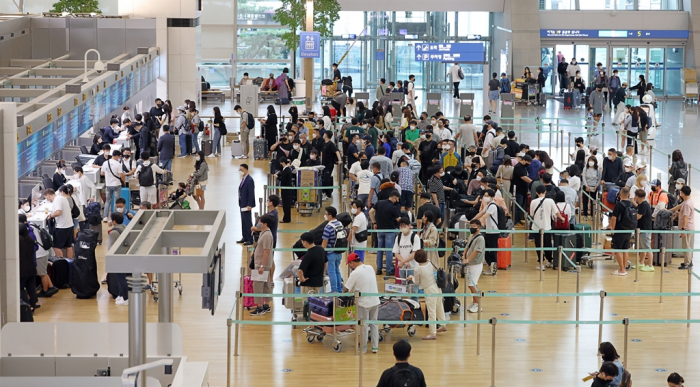Foreign exchange
Falling won yet to cool Koreans’ fever for overseas travel
The won hit 1,442.2/dollar, its weakest since March 16, 2009, on growing recession fears, pipeline blasts in Europe, soft yuan
By Sep 28, 2022 (Gmt+09:00)
2
Min read
Most Read
LG Chem to sell water filter business to Glenwood PE for $692 million


Kyobo Life poised to buy Japan’s SBI Group-owned savings bank


KT&G eyes overseas M&A after rejecting activist fund's offer


StockX in merger talks with Naver’s online reseller Kream


Mirae Asset to be named Korea Post’s core real estate fund operator



The South Korean won has continued its decline to hit lows not seen since the 2008-09 global financial crisis on sustained concerns of an economic downturn amid the world’s interest rate hikes, but surging demand for overseas travel among Koreans given eased COVID-19 restrictions is expected to put further pressure on the currency.
The won on Wednesday dropped as much as 1.4% to 1,442.2 per dollar, its weakest level since March 16, 2009. The local unit lost ground on mounting worries of a global economic recession after Apple Inc. dropped plans to raise production of its new iPhones this year. Other factors bringing down the won were explosions damaging pipelines carrying Russian natural gas to Europe, as well as a weaker Chinese yuan.
The won was the worst performer among emerging Asian currencies with a 17.4% depreciation against the dollar so far this year. Such weakness usually increases the costs for South Koreans going on international trips.
But this was not a big issue to South Koreans who have been dreaming of vacations in other countries for more than two years due to COVID-19.
The number of outbound tourists surged 561% to 674,022 in July from a year earlier, according to the Korea Tourism Organization.
MOUNTING TRAVEL ACCOUNT DEFICIT
That came as countries worldwide such as Japan opened up their borders as the pandemic waned and oil prices slid from their highs, lowering airline ticket prices. South Koreans are expected to take advantage of these factors to go abroad, hurting the country’s current account balance.
The travel account deficit in July totaled $860.1 million, the largest since January 2020, the Bank of Korea data showed. In the first seven months, the deficit rose 21.7% to $4.3 billion on-year, according to the data.
Such growth was predicted to put further pressure on the overall current account of Asia’s fourth-largest economy, which has already been hurt by continuous trade deficits.
Japan was South Korean tourists’ favorite destination as the neighboring country last week announced it will allow visa-free, independent tourism and abolish its daily arrival cap as of Oct. 11.
The yen’s weakness also means Koreans' money goes further for travel in Japan. The Japanese currency has lost more than 20% against the dollar so far this year, underperforming the South Korean won.
Sales of airplane tickets for flights from South Korea to Japan’s major cities such as Tokyo and Osaka surged by 7,196% in the first 25 days of September from a month earlier, according to South Korea’s e-commerce company TMON Inc. on Wednesday.
Hanatour Service Inc., a local travel agency, also said reservations for trips to the island country soared by 1,120% during the period.
Write to Mi-Hyun Jo at mwise@hankyung.com
Jongwoo Cheon edited this article.
More to Read
-
 EconomyADB cuts Korea’s 2023 growth outlook as trade in deficit for sixth month
EconomyADB cuts Korea’s 2023 growth outlook as trade in deficit for sixth monthSep 21, 2022 (Gmt+09:00)
3 Min read -
 AirlinesKorea airlines to increase flights on eased COVID-19 rule
AirlinesKorea airlines to increase flights on eased COVID-19 ruleAug 31, 2022 (Gmt+09:00)
2 Min read
Comment 0
LOG IN


